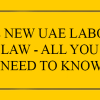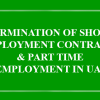The Ministry of Human Resources and Emiratisation, under the leadership of the UAE President, His Highness Sheikh Khalifa bin Zayed Al Nahyan, recently unveiled its new labour law. The new law, which effects a plethora of amendments to the existing labour law framework,
Official sources state that the new law, Federal Decree Law No. 33 of 2021- which replaces its predecessor Federal Law No. 8 of 1980- shall come into effect from 02.02.2022. The official statute is divided into 12 Titles, each dealing with a unique subject matter. The Minister of Human Resources and Emiratisation, Dr. Abdulrahman Al Awar, has said in an official statement that this law has been drafted in accordance with the UAE Government’s vision to create a flexible and competitive business environment at a time the nation is about to embark on its journey towards the next 50 years.
In this article, we are going to explore some of the major highlights of the new law and how they are likely to impact the sector.
Note that the article is prepared for guidance only and specialist legal advice from the employment lawyer qualified to practice in Dubai must be taken on specific circumstances.
Concept of Limited Contract
One of the major changes that the new law has brought forth is the concept of ‘limited contract’. This means that employers will no longer be on an unlimited tenure but instead, it will be for a fixed duration (not more than 3 years) post which the contract shall have to be renewed with the consent of both parties. This concept is expected to lend flexibility to professional spheres as both the employer as well as the employee will have the choice regarding the renewal of the contract. If the employer and the employee continue to perform the contract after its expiry without renewal it will be deemed to be renewed on the same terms as the previous contract.
Additional Leaves
In addition to annual and sick leaves, the new framework under Section 32 has also introduced certain additional circumstances in which leave can be taken.
- The new law has for the first time introduced the concept of paternity leave. This provision allows the father to take a leave of 5 days at any point during the six months following the birth of his child.
- In view of an employee’s emotional well-being, a mourning leave of 5 days shall be granted in case of the death of a spouse, and the same shall be 3 days in case of a parent, child, sibling, grandchild, or grandparent’s demise.
- For an employee who is currently attending an educational institution in the UAE, a study leave of 10 working days per year shall be provided for such person to take the examinations- provided he has completed a minimum of 2 years of service with his current employer.
Maternity Leave
Compared to the erstwhile provisions, the new law makes an earnest effort to acknowledge the hardships of female workers (especially during and after pregnancy) and attempts to level the playing field. One of the biggest welcome changes has been an added emphasis on maternity leave and additional perks for the pregnant female worker, which is expected to make the transition back to work easier.
As envisaged by the now amended provisions, the female worker:
- Shall be entitled to extended maternity leave for a duration of sixty days (with pay for the first forty-five days and without pay for the next fifteen days) including pre-natal and post-natal periods. Furthermore, an additional period of forty-five consecutive or non-consecutive days has been permitted during which the female worker can stay away from work without pay, owing to the illness of the mother or child or as a result of pregnancy or delivery.
- Who delivers a sick child or a child with special needs shall be entitled to an additional 30 days’ paid leave commencing from the expiry of maternity leave.
- Shall, for a period of six months subsequent to the date of delivery, be entitled to two additional rest periods, each for a maximum of half an hour. Furthermore, such rest periods shall be deemed to be a part of working hours and shall not entail any deduction of wage.
Varying Models Of Work
The new law takes cognizance of changing times and accordingly recognizes different models of work or employment. These are as follows:
- Full-time in which the individual works for only one employer
- Part-time in which an individual may work for one or more employers on a fixed number of days or for a fixed number of hours.
- Temporary work which usually one specific task and ends with its completion or a deadline-specific work (also known as freelancing)
- Flexible work usually involves changing work hours or working days depending upon the changes in workload and requirements of the employer.
Non-compete clause
Another major innovation of the new law has been to recognize the importance of protecting trade secrets from arbitrary employee defections. The law has introduced the provision for a concrete non-compete clause as a positive measure in this direction.
- In circumstances where the employee has access to the employer’s customer or business secrets, the Employer may provide for a non-compete clause in the Employment Contract. This clause, the maximum duration of which cannot exceed 2 years, shall effectively prohibit the employee from competing directly with his previous employer as well engaging in a business that competes with the ex-employer in the same sector.
- The law also clearly states that such a non-compete clause shall be applicable only if in case of termination, the employer works in accordance with the provisions thereby given in the law.
Welfare Provisions
From a prima facie reading of the new law, it becomes clear that workers’ rights and human rights, in general, have been held in the highest regard. These are some of the welfare provisions that the statute has consolidated:
- Forced labour, as well as the exercise of sexual harassment, bullying, or any verbal, physical, or mental violence against the worker, is strictly prohibited under the law.
- There are explicit provisions concerning a worker’s entitlements upon death. Upon the demise of any worker, the employer has been obligated with paying the family any wages or entitlements due to the work along with the severance pay within a period of 10 days from the date of such demise or from the date of the employer’s awareness of such demise. Furthermore, the costs of processing and transporting the remains of the worker to his residence also have to be borne by the employer. Lastly, if the worker suffers death owing to a work injury, the employer shall be liable to pay the family the basic wage equivalent to 24 months.
- The law deems 8 hours to be the maximum ordinary working hours in a day.
- Provisions under Article 19 of the new framework also clearly lay down the overtime policy, entitling the workers to supplementary income to the tune of 25%-50% of their basic wage depending upon the nature of overtime.
- If the worker suffers an injury or contracts an occupational disease in the line of work, the employer shall have to bear the treatment costs in their entirety. In addition, the employer shall also pay a full wage to the worker during his period of treatment or for 6 months, whichever is lesser. If the period for such treatment exceeds 6 months, the employer shall be liable to pay half wage for the subsequent 6 months.
Probation
The new law necessitates that the employer gives a 2-week notice prior to terminating an employee on probation. Similarly, obligations have also been imposed on the worker. If any individual wishes to migrate to another employer in the UAE during the probationary period, he or she shall have to serve a notice for the same at least one month prior to the termination of the employment contract. The law also provides for compensation for the aggrieved party if the other party violates the provision given under this Article.
Labour Or Employment laws form the backbone of commercial development in any ecosystem across the globe. Needless to say, the new federal labour laws have been enacted from a progressive point of view. In fact, several of the provisions seem to be specifically tailored to match and sustain UAE’s rapid economic growth in recent times. Moreover, the framework has laid strong emphasis on the welfare of the workers by guaranteeing several social security measures that are aimed at retaining the trust of the workers and enhancing productivity. At the same time, the provisions have also attempted to strike a balance between the employer and employee’s rights. The initial response to the amendments have been extremely positive, and experts believe that effective implementation of these provisions could for all practical purposes, become a defining influence on the country’s developmental trajectory.






